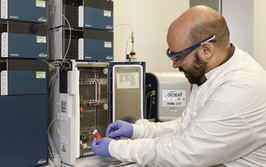
Sharing is Caring (for Animals)
How an initiative from EFPIA and a new public database on chemical substances could, in time, reduce animal experiments
I – as do many others – accept the necessity of animal testing in drug development. But that doesn’t mean it sits comfortably. More than one person in the industry has described animal testing to me as a “necessary evil” and there is a clear drive to reduce it. Last year, the EMA put in place a free service as part of its Innovation Task Force (ITF) to support drug developers in replacing, reducing and refining animal use – for both human and veterinary medicines.
Earlier this week, a new not-for-profit initiative was launched by the EFPIA, the European Chemical Agency (ECHA), and four pharma companies (Boehringer Ingelheim, Roche, J&J, and Merck KGaA). Essentially, the initiative is about voluntarily making data public, such as physicochemical, toxicological and ecotoxicological data on chemical substances – which could be used to “improve the hazard characterization of structural analogues, optimize their safe use and can potentially lead to a reduction in animal testing.”
The four pharma companies have already released data as part of the initiative, which can be downloaded as an IUCLID dataset. It currently includes the hazard properties of 19 substances from 153 tests. The right to access and use the dataset is open to everyone.
But this is just the beginning – it is hoped that more companies will volunteer to share their data in the database. The initiative is open to other EFPIA-member companies – and non-members can also get in touch with ECHA if they would like to contribute data. The dataset will be hosted by ECHA.
In a statement, Jan Beckmann, Head of Chemical Legislation at Roche, said, “Companies provide this high-quality data free of charge for the benefit of society. Our aim is to enhance the effectiveness of database-dependent computational tools, such as QSARs, for testing the safety of structurally similar chemicals. Scientists can use the data to gradually reduce testing on animals. This initiative is open to any company and I invite all to join and share their archived data.”
You can also find more details in EFPIA’s FAQ.
It’s a small step, but the backing of EFPIA, ECHA, and four large pharma companies is a fantastic start. For many companies, embracing new approaches to animal testing is difficult because of the inherent challenges of adopting new technologies and approaches. In silico modeling, organ on chips, and tests based on human cells or organoids can be used to reduce animal testing, but pharma companies are often nervous of trying something different – and, of course, new technologies come with a need for new expertise (and new costs!).
Even for pharma companies unwilling to commit to new approaches, why not make some bold decisions about the swathes of chemical data that no longer have any economic value (such as data on substances that were not pursued or intermediates that are no longer used). Useful information is sitting in archives gathering digital dust when it could be shared to enhance the effectiveness of database-dependent prediction tools and improve theoretical models of structure–activity relationships, ultimately, helping academic researchers and drug developers reduce (or even avoid) animal testing.
In short, this new initiative allows all companies to contribute to the reduction of animal testing. And it’s about time there was a little more sharing in our wonderful industry!

Making great scientific magazines isn’t just about delivering knowledge and high quality content; it’s also about packaging these in the right words to ensure that someone is truly inspired by a topic. My passion is ensuring that our authors’ expertise is presented as a seamless and enjoyable reading experience, whether in print, in digital or on social media. I’ve spent fourteen years writing and editing features for scientific and manufacturing publications, and in making this content engaging and accessible without sacrificing its scientific integrity. There is nothing better than a magazine with great content that feels great to read.



















